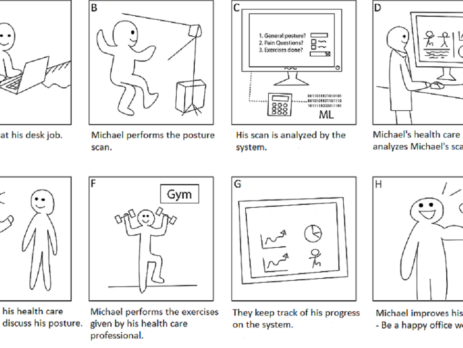We investigated how digital posture scanning data can enhance and personalize physiotherapy services. Through a case study of a posture scan recording system (PSRS), we identified three key roles of posture scanning: diagnosing conditions, visualizing data for shared decision-making, and evaluating treatment impact. These findings illustrate how integrating digital tools into care pathways can empower both patients and professionals in achieving better health outcomes.
What was the context of our study?
Physiotherapy often relies on patient-reported symptoms and manual assessments, which can be subjective and time-consuming. With the rise of data-driven health technologies, tools like posture scanning systems offer opportunities to enhance physiotherapy by providing objective, actionable data. However, adoption of such tools in physiotherapy has been limited, necessitating an investigation into their benefits and implementation.
What did we do?
We conducted a qualitative case study focusing on the PSRS, a system designed to capture and analyze posture and movement data. Data was collected through interviews with 22 stakeholders, including physiotherapists, technology developers, and patients. Thematic analysis was used to identify ways the PSRS supports personalized care.
What did we find?
Our study revealed three critical ways the PSRS supports personalized physiotherapy. By analyzing movement data, the PSRS helps identify underlying issues, such as biomechanical imbalances, enabling targeted treatment plans. Visual data from the PSRS fosters communication between therapists and patients, helping patients understand their condition and treatment goals. The system tracks progress over time, enabling professionals and patients to adjust care plans based on measurable improvements or stagnation.
Why is this important?
By integrating digital posture scanning into physiotherapy, we can shift from a one-size-fits-all approach to truly personalized care. This not only improves treatment outcomes but also enhances patient engagement and satisfaction. Our findings highlight the potential of such tools to transform physiotherapy practices, paving the way for broader adoption of data-driven solutions in healthcare.
Reference
Korhonen O, Väyrynen K, Krautwald T, et al. Data-Driven Personalization of a Physiotherapy Care Pathway: Case Study of Posture Scanning. *JMIR Rehabil Assist Technol.* 2020;7(2):e18508. https://doi.org/10.2196/18508.

